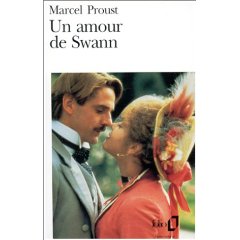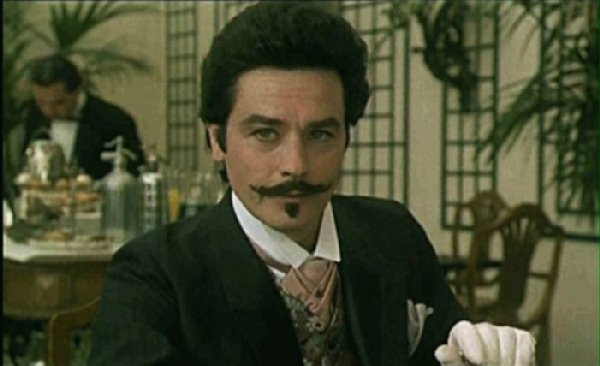|

 ● 9. 斯萬Swann, Charles
● 9. 斯萬Swann, Charles
|
瀏覽2,221 |回應1 |回應1 |推薦1 |推薦1 |
|
|
|
角色:斯萬Swann, Charles 角色原型:朋友夏賀勒哈斯Charles Haas (曾經是Sarah Bernhardt 的情人, 一個花花公子, 第一位參加賽馬俱樂部的猶太人) / 普魯斯特自己 角色介紹:敘述者父母之猶太朋友, 與貴族圈關係甚佳, 卻因娶奧黛特而受到排擠  ↑ Charles Haas  以下來自 "Swann’s Way" by Henri Raczymow 介紹 "a dandy whose fame did not exceed his own lifetime" ~~ 以下來自 "Swann’s Way" by Henri Raczymow 介紹 "a dandy whose fame did not exceed his own lifetime" ~~
Raczymow’s book is essentially an exploration of Swann and the models for the Swann character, most specifically, Charles Haas. Haas was a French Jew, the first Jewish member of the Jockey Club, and a man whose reputation as a wit and a socialite was exceeded only by his pride in his own idleness and connections. There’s no doubt that Haas was the model for Swann. The memoirs of the day confirm it; Proust wrote as much in letters. From this fact, Raczymow constructs a brief biography of Haas, a dissection of Swann, and an extended meditation on some of what it meant to be a Jew in the Belle Époque.Raczymow’s book is best when he’s writing from the close intersections between Proust’s biography, Haas’ biography, Swann’s character, and the confusion all three exert on each other. The short sections in which he talks about Proust’s obvious failure to remember who (Swann or Haas) is fictional are brilliant and provide more than a little insight into Proust’s attitude as he wrote. The kind of confusion engendered by the shifting differences between real life and his novel clearly became overwhelming at times, and Proust would write letters in which he used Swann’s name when he should have been talking about Haas. But these moments then lead to the set of questions that are obscured at the start of Raczymow’s book, questions about immortality and time, and ultimately, in a strange way, the place of Jews in French society. It’s impossible to read In Search of Lost Time without wondering about the hatred Proust shows to Jews and homosexuals. It’s unavoidable, and although sometimes the sentiments are offered in the mouths of his characters, at other times it seems clear that the narrator (and then Proust) is offering his own opinions. Even if we resist, as we must, the urge to reduce the novel to autobiography, these sentiments are ones with which we have to come to terms with as we read. Swann is not only tremendously socially successful, he’s a Jew, as was Proust. Swann’s Jewishness is emphasized at crucial points in the novel, as he gets sick, as he loses power (in the social sphere), as Gilberte grows up after he has died. Raczymow catalogs these moments and never fails to delicately relate them to the biography of Haas, and indeed, of Proust. What becomes most clear over the course of his short book is that Raczymow’s conception of Haas and of Swann is one radical contingency, and we’re left wondering why Proust made such a contingent figure, someone whose position and glamor rested very much on a kind of sufferance, the hero to the narrator as he’s growing up. Raczymow’s book is also about what immortality, literary or otherwise, means. It’s clear from almost the start of this book that Haas is a person whose brilliance in life produced nothing, aside from one daughter, and who consequently is not remembered for any reason aside from (sometimes) his friends. Proust was aware of saving Haas from oblivion, of writing a character who would keep his model alive. Proust was also obviously writing a novel that would keep his own name alive. But the effect of Raczymow’s meditation on Haas, his unearthing of obscure Haas relatives, his pursuit of his hare, is to highlight how ephemeral an individual life is, even one partially preserved in a masterpiece. Haas becomes a vehicle for Raczymow to consider his own mortality, a project any decent reading of Proust engenders.This kind of book threatens to be the worst that Proust criticism has to offer. In Search of Lost Time is many things, least of which is a catalog of correspondence between actual people and their fictional equivalents. Part of what makes Proust’s novel so difficult to write about is precisely the artistry that Proust used to distort ‘reality.’ Certainly it’s worth exploring the ways in which Proust’s life and experience informed his writing, but the temptation of reducing his novel to its constituent parts not only makes of it less than it is, it obviates Proust’s initial impetus to write contra Sainte-Beuve. But Raczymow manages to easily walk the line that separates the banal from the useful.  斯萬對新交無比殷勤,眉飛色舞地一一舉出 他們的姓名,這種態度好似那些謙虛或慷慨的大藝術家:他們在晚年也許嘗試烹飪或園藝, 為自己的拿手好菜或花壇沾沾自喜,只能聽誇獎,不能聽批評。但一旦涉及他們的傑作,他 們是樂於傾聽批評的;或者說,他們可以慷慨大方地贈送一幅名畫,可是在多米諾牌桌上輸 了四十蘇卻滿不高興。/ 當他和她結婚時,他已不再愛 她,他身上那個熱切希望與?黛特結成終身伴侶又如此絕望的人已經死去。/ 當他為奧黛特痛苦時, 他多麼盼望有一天讓她看看他愛上了別的女人; 現在他可以做到這一點, 卻小心翼翼地不讓妻子知到自己另有新歡。 斯萬對新交無比殷勤,眉飛色舞地一一舉出 他們的姓名,這種態度好似那些謙虛或慷慨的大藝術家:他們在晚年也許嘗試烹飪或園藝, 為自己的拿手好菜或花壇沾沾自喜,只能聽誇獎,不能聽批評。但一旦涉及他們的傑作,他 們是樂於傾聽批評的;或者說,他們可以慷慨大方地贈送一幅名畫,可是在多米諾牌桌上輸 了四十蘇卻滿不高興。/ 當他和她結婚時,他已不再愛 她,他身上那個熱切希望與?黛特結成終身伴侶又如此絕望的人已經死去。/ 當他為奧黛特痛苦時, 他多麼盼望有一天讓她看看他愛上了別的女人; 現在他可以做到這一點, 卻小心翼翼地不讓妻子知到自己另有新歡。
|
  ↑電影Swann in love"斯萬之愛"_導演Volker Schlöndorff(代表作:錫鼓)
本文於 修改第 3 次
|
 The last paragraph of Swann in love---斯萬之戀的結局
The last paragraph of Swann in love---斯萬之戀的結局
|
|
|
推薦1 |
|
|
|
醒來一小時後,當他指點理髮師怎樣使他的頭髮在火車上不致蓬亂時,他又想到他那個夢,又看到奧黛特蒼白的臉色、瘦削的面頰,疲憊的臉龐、低垂的眼皮,仿佛全都就在他的眼前;奧黛特的萬般柔情早已把斯萬對她的執著的愛化為對她的首次印象的長期遺忘——自從他們最初相愛以來這些日子,在他剛才睡著時,他在記憶中都曾竭力搜尋它們的確切感覺,從那時以來他已不再注意到的東西也仿佛就在他的眼前。自從他不再感到不幸,道德修養也隨之有所降低以來,粗野的話也不時湧上他的心頭,他心裏不禁咆哮起來:“我浪擲了好幾年光陰,甚至恨不得去死,這都是為了我把最偉大的愛情給了一個我並不喜歡,也跟我並不一路的女人!” (p.411-412 追憶似水年華 I 在斯萬家那邊 聯經版 1992) But while, an hour after his awakening, he was giving instructions to the barber, so that his stiffly brushed hair should not become disarranged on the journey, he thought once again of his dream; he saw once again, as he had felt them close beside him, Odette’s pallid complexion, her too thin cheeks, her drawn features, her tired eyes, all the things which—in the course of those successive bursts of affection which had made of his enduring love for Odette a long oblivion of the first impression that he had formed of her—he had ceased to observe after the first few days of their intimacy, days to which, doubtless, while he slept, his memory had returned to seek the exact sensation of those things. And with that old, intermittent fatuity, which reappeared in him now that he was no longer unhappy, and lowered, at the same time, the average level of his morality, he cried out in his heart: “To think that I have wasted years of my life, that I have longed for death, that the greatest love that I have ever known has been for a woman who did not please me, who was not in my style!” (Translated by C. K. Scott Moncrieff ) Mais tandis que, une heure après son réveil, il donnait des indications au coiffeur pour que sa brosse ne se dérangeât pas en wagon, il repensa à son rêve ; il revit, comme il les avait sentis tout près de lui, le teint pâle d’Odette, les joues trop maigres, les traits tirés, les yeux battus, tout ce que – au cours des tendresses successives qui avaient fait de son durable amour pour Odette un long oubli de l’image première qu’il avait reçue d’elle – il avait cessé de remarquer depuis les premiers temps de leur liaison, dans lesquels sans doute, pendant qu’il dormait, sa mémoire en avait été chercher la sensation exacte. Et avec cette muflerie intermittente qui reparaissait chez lui dès qu’il n’était plus malheureux et qui baissait du même coup le niveau de sa moralité, il s’écria en lui-même : « Dire que j’ai gâché des années de ma vie, que j’ai voulu mourir, que j’ai eu mon plus grand amour, pour une femme qui ne me plaisait pas, qui n’était pas mon genre ! » (l’édition Gallimard, Paris, 1946-47 )
|
|
|


 本城市首頁
本城市首頁



























